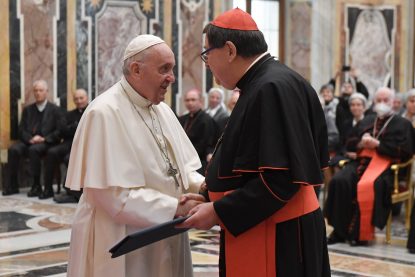
Pope Francis greets Brazilian Cardinal João Braz de Aviz, prefect of the then-Congregation for Institutes of Consecrated Life and Societies of Apostolic Life, during an audience with members of the congregation at the Vatican Dec. 11, 2021. (CNS photo/Vatican Media)
VATICAN CITY (CNS) — In a further sign that he believes more care is needed in setting up diocesan religious orders, Pope Francis issued a decree requiring bishops to obtain written permission from the Vatican to start an “association of the faithful” as a first step toward forming a religious order.
“Before the diocesan bishop erects — by decree — a public association of the faithful with a view to becoming an institute of consecrated life or society of apostolic life of diocesan right, he must obtain a written license from the Dicastery for Institutes of Consecrated Life and Societies of Apostolic Life,” said the decree published by the Vatican June 15.
In November 2020, the pope had issued a decree that bishops must have written approval from the Vatican to start a diocesan religious order.
Meeting with members of the dicastery in December, Pope Francis had said it was important to foster collaboration and dialogue between the dicastery and bishops “regarding discernment in view of the approval of new institutes, new forms of consecrated life or new communities.”
[hotblock]
“I urge pastors not to be frightened and to fully welcome your accompaniment,” he had said. “It is the responsibility of the pastor to accompany and, at the same time, accept this service.”
“This collaboration, this synergy between the dicastery and the bishops also makes it possible to avoid — as the (Second Vatican) Council asks — the inappropriate creation of institutes without sufficient motivation or adequate vigor, perhaps with good will, but with something missing,” the pope had said. “Your service is valuable in trying to provide pastors and the people of God with valid criteria for discernment.”
In May 2016 Pope Francis already had ruled invalid the establishment of diocesan-right orders established by bishops without consulting the Holy See, but apparently if the consultation resulted in a negative judgment by the Vatican dicastery some bishops moved ahead anyway, citing the fact that the consultation occurred.
Large, international religious orders of women or of men, answering directly to the Vatican, are called congregations of “pontifical right.” Local congregations, approved by a diocesan bishop, are called congregations of “diocesan right.”
Pope Francis has spoken in the past of the need to ensure all religious orders have the constitutions, structure and assistance they need to contribute to the life of the local church and fully protect the rights, dignity and safety of all their members.
PREVIOUS: Spiritual and human care: Chaplains help Ukrainian soldiers with both
NEXT: Vatican suggests revamped, year-long marriage prep


Share this story